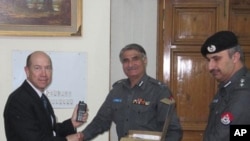Assistant Secretary of State David Johnson told a U.S. House of Representative subcommittee that the State Department works with international partners "to isolate, minimize, and neutralize transnational drug enterprises;" to "develop, train, and empower civilian law enforcement to fight crime, including illicit narcotics networks in a number of countries in Latin America and the Middle East;" and to design and launch public information campaigns about the danger of narcotics in South Central Asia."
Other State Department-sponsored programs in more remote regions of Peru and Colombia are aimed at strengthening the rule of law and governance. Fostering safe, secure and humane corrections systems that can serve as platforms for addiction treatment is another U.S. goal, together with developing drug treatment centers for vulnerable populations, including women and children in Afghanistan.
International cooperation has shown promising results. U.S.-Colombia cooperation, said Assistant Secretary Johnson, has significantly improved public security there, reduced coca cultivation and cocaine production potential, demobilized more than 50,000 paramilitary and guerilla combatants, improved transparency and efficiency of justice, and improved human rights conditions. "Colombia is now a stronger democracy," he noted, "and able to share the expertise it has developed with countries such as Afghanistan, Mexico, Haiti and other Latin American nations."
In Afghanistan, Assistant Secretary Johnson said, "We are currently working with our interagency and international partners to target narcotics traffickers and drug lords – especially those with ties to the insurgency." Narcotics control is key to helping Afghanistan build effective government and civil society and remove corruption and violence from Afghan politics.
Because Central Asia is an important route for Afghan opiates, the U.S. is working closely with drug control agencies and border services in the region to improve interdiction, law enforcement information sharing, and border controls.
The U.S. is also working with West African nations to help them eliminate the safe havens now enjoyed by cocaine traffickers, some with links to crime cartels in Colombia.
Reducing drug demand is another U.S. goal and, to this end, the U.S. State Department, during 2009, worked with some 400 community groups in 30 countries.
The United States is committed to cooperating closely with other countries to interdict narcotics trafficking, bring traffickers to justice, educate the public, strengthen the rule of law, and reduce drug demand.
U.S. Counter-Drug Policies

The U.S. State Department works with international partners to reduce drug enterprises by empowering civilian law enforcements and educating the public.



